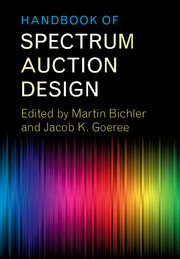Book contents
- Frontmatter
- Contents
- List of Contributors
- Preface
- List of Papers
- Part I The Simultaneous Multiple-Round Auction
- 1 Putting Auction Theory to Work: The Simultaneous Ascending Auction
- 2 An Equilibrium Analysis of the Simultaneous Ascending Auction
- 3 The Efficiency of the FCC Spectrum Auctions
- 4 Measuring the Efficiency of an FCC Spectrum Auction
- Part II The Combinatorial Clock Auction Designs
- Part III Alternative Auction Designs
- Part IV Experimental Comparisons of Auction Designs
- Part V The Bidders’ Perspective
- Part VI Secondary Markets and Exchanges
- Outlook
- References
4 - Measuring the Efficiency of an FCC Spectrum Auction
from Part I - The Simultaneous Multiple-Round Auction
Published online by Cambridge University Press: 26 October 2017
- Frontmatter
- Contents
- List of Contributors
- Preface
- List of Papers
- Part I The Simultaneous Multiple-Round Auction
- 1 Putting Auction Theory to Work: The Simultaneous Ascending Auction
- 2 An Equilibrium Analysis of the Simultaneous Ascending Auction
- 3 The Efficiency of the FCC Spectrum Auctions
- 4 Measuring the Efficiency of an FCC Spectrum Auction
- Part II The Combinatorial Clock Auction Designs
- Part III Alternative Auction Designs
- Part IV Experimental Comparisons of Auction Designs
- Part V The Bidders’ Perspective
- Part VI Secondary Markets and Exchanges
- Outlook
- References
Summary
Introduction
The US Federal Communications Commission (FCC) auctions licenses of radio spectrum for mobile phone service, employing an innovative simultaneous ascending auction. We study data from the 1995–1996 auction of licenses for the C Block of the 1900 MHz PCS spectrum band. The C block divided the continental United States into 480 small, geographically distinct licenses. A mobile phone carrier that holds two geographically adjacent licenses can offer mobile phone users a greater contiguous coverage area. One intent of auctioning small licenses is to allow bidders, rather the FCC, to decide where geographic complementarities lie. Bidders can assemble packages of licenses that maximize the benefits from geographic complementarities. The US practice of dividing the country into small geographic territories differs markedly from European practice, where nationwide licenses are often issued. These nationwide licenses ensure that the same provider will operate in all markets, so that all geographic complementarities are realized.
Economic theory suggests that the allocation of licenses in a simultaneous ascending auction need not be allocatively efficient. Brusco and Lopomo (2002) and Engelbrecht- Wiggans and Kahn (2005) demonstrate that bidders may implicitly collude through the threat of bidding wars. For example, a bidder might not add an additional license to a package to take advantage of complementarities because of threats of higher, retaliatory bids on the bidder's other licenses. For auctions of multiple homogeneous items, Ausubel and Cramton (2002) demonstrate that bidders may find it profitable to unilaterally reduce demand for licenses, similarly to a monopolist raising prices and profits by reducing supply. The concern about intimidatory collusion and demand reduction in FCC spectrum auctions is well founded. Cramton and Schwartz (2000, 2002) show that bidders in the AB block did not aggressively compete for licenses and in the later DEF block auction used the trailing digits of their bids to signal rivals not to bid on other licenses.
Information
- Type
- Chapter
- Information
- Handbook of Spectrum Auction Design , pp. 62 - 108Publisher: Cambridge University PressPrint publication year: 2017
